Electric Vehicle Report: Volvo's Product Life Cycle in Europe
VerifiedAdded on 2023/01/11
|9
|2740
|34
Report
AI Summary
This report delves into the electric vehicle (EV) market in Europe, examining the product life cycle (PLC) and Porter's value chain for Volvo, a prominent player in the industry. The report begins by outlining the PLC stages—introduction, growth, maturity, and decline—and how Volvo should adapt its marketing strategies, including the 4Ps (product, price, place, and promotion), to each stage. It then applies Porter's value chain to analyze Volvo's activities, both primary (inbound logistics, operations, outbound logistics, marketing and sales, and service) and support (procurement, human resource management, technological development, and infrastructure), to identify areas for competitive advantage. The report assesses the changing landscape of the EV industry, driven by environmental concerns and government regulations, and evaluates Volvo's strategic positioning, including its responses to competitors like Tesla. The critical assessment highlights Volvo's adoption of market trends, competitive challenges, and the importance of marketing in gaining market share within the evolving European EV market.
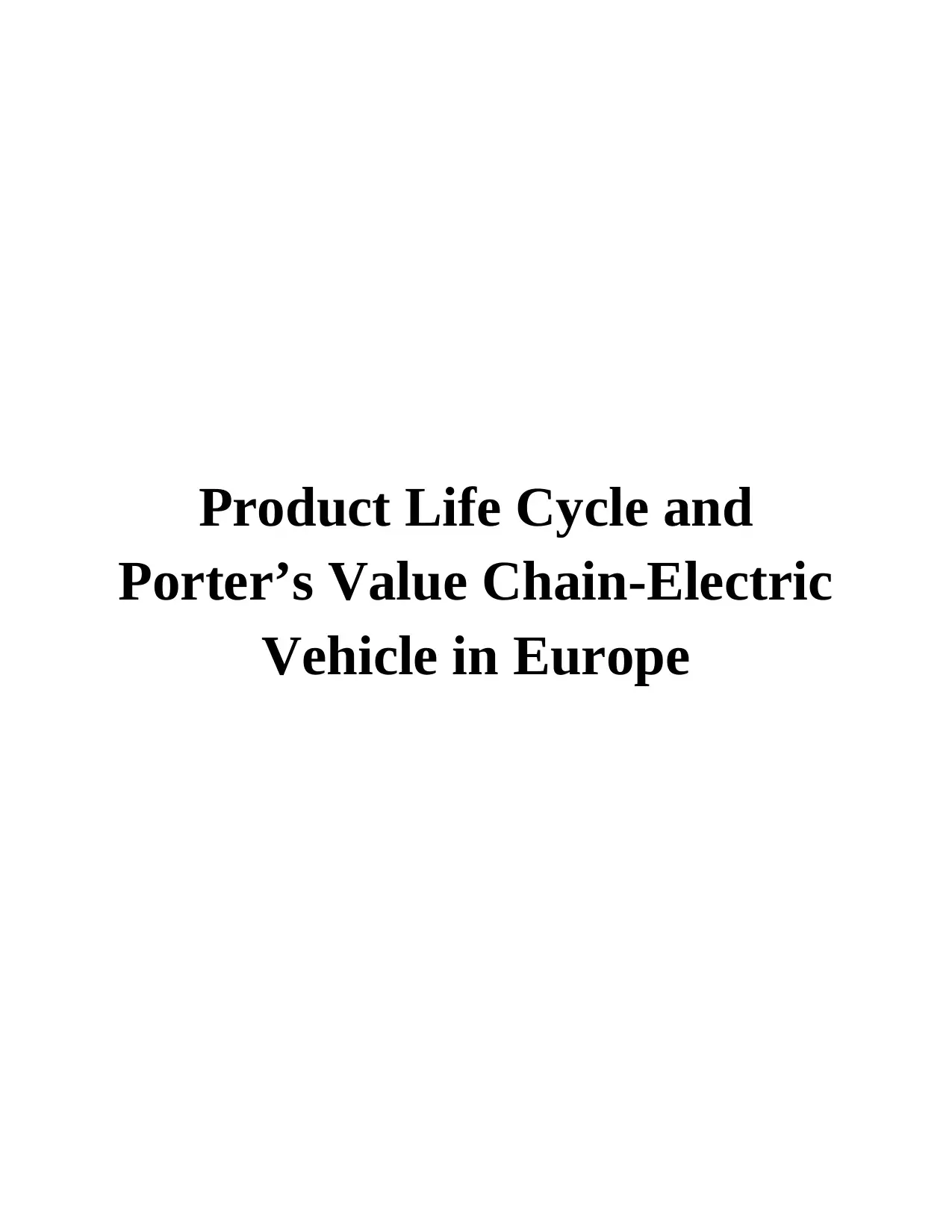
Product Life Cycle and
Porter’s Value Chain-Electric
Vehicle in Europe
Porter’s Value Chain-Electric
Vehicle in Europe
Paraphrase This Document
Need a fresh take? Get an instant paraphrase of this document with our AI Paraphraser
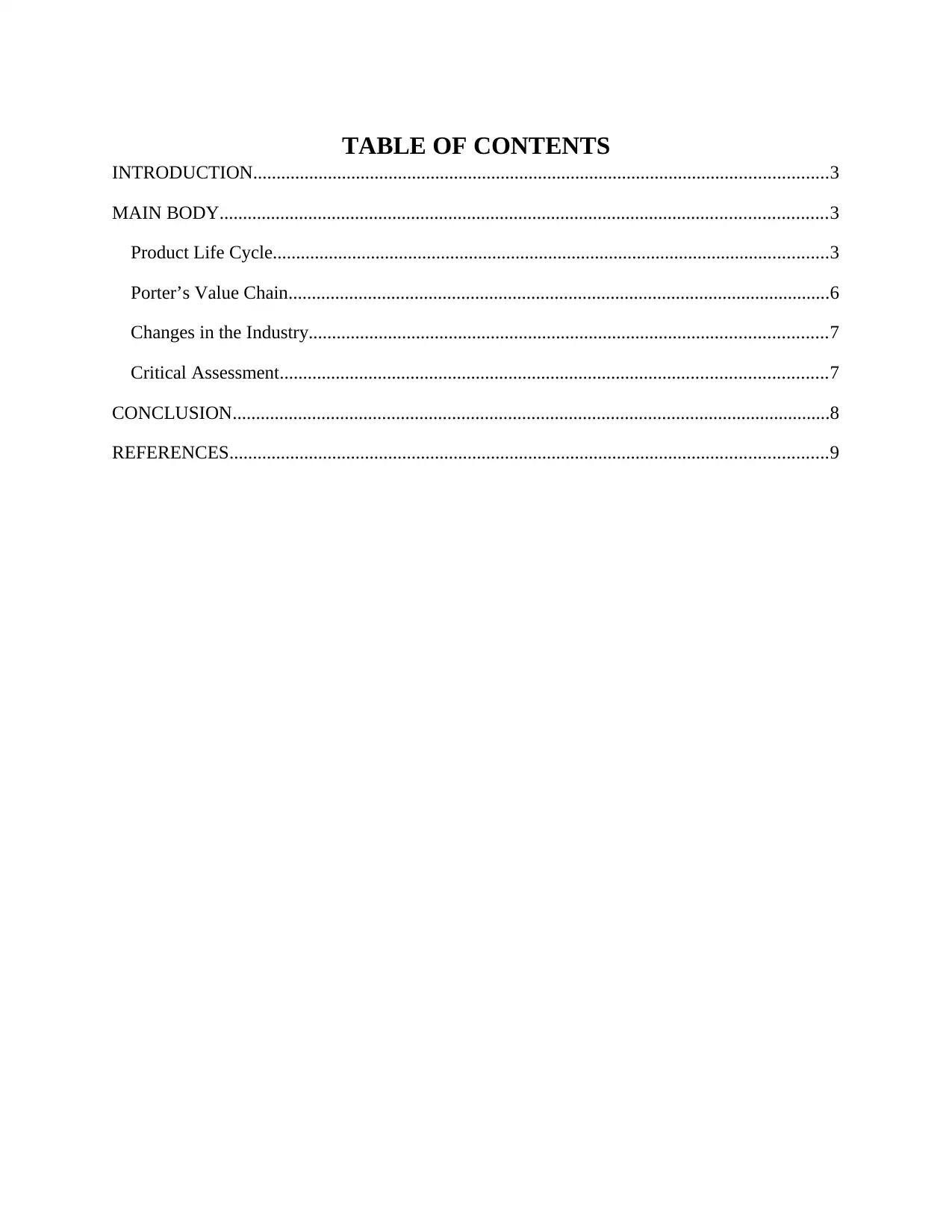
TABLE OF CONTENTS
INTRODUCTION...........................................................................................................................3
MAIN BODY..................................................................................................................................3
Product Life Cycle.......................................................................................................................3
Porter’s Value Chain....................................................................................................................6
Changes in the Industry...............................................................................................................7
Critical Assessment.....................................................................................................................7
CONCLUSION................................................................................................................................8
REFERENCES................................................................................................................................9
INTRODUCTION...........................................................................................................................3
MAIN BODY..................................................................................................................................3
Product Life Cycle.......................................................................................................................3
Porter’s Value Chain....................................................................................................................6
Changes in the Industry...............................................................................................................7
Critical Assessment.....................................................................................................................7
CONCLUSION................................................................................................................................8
REFERENCES................................................................................................................................9
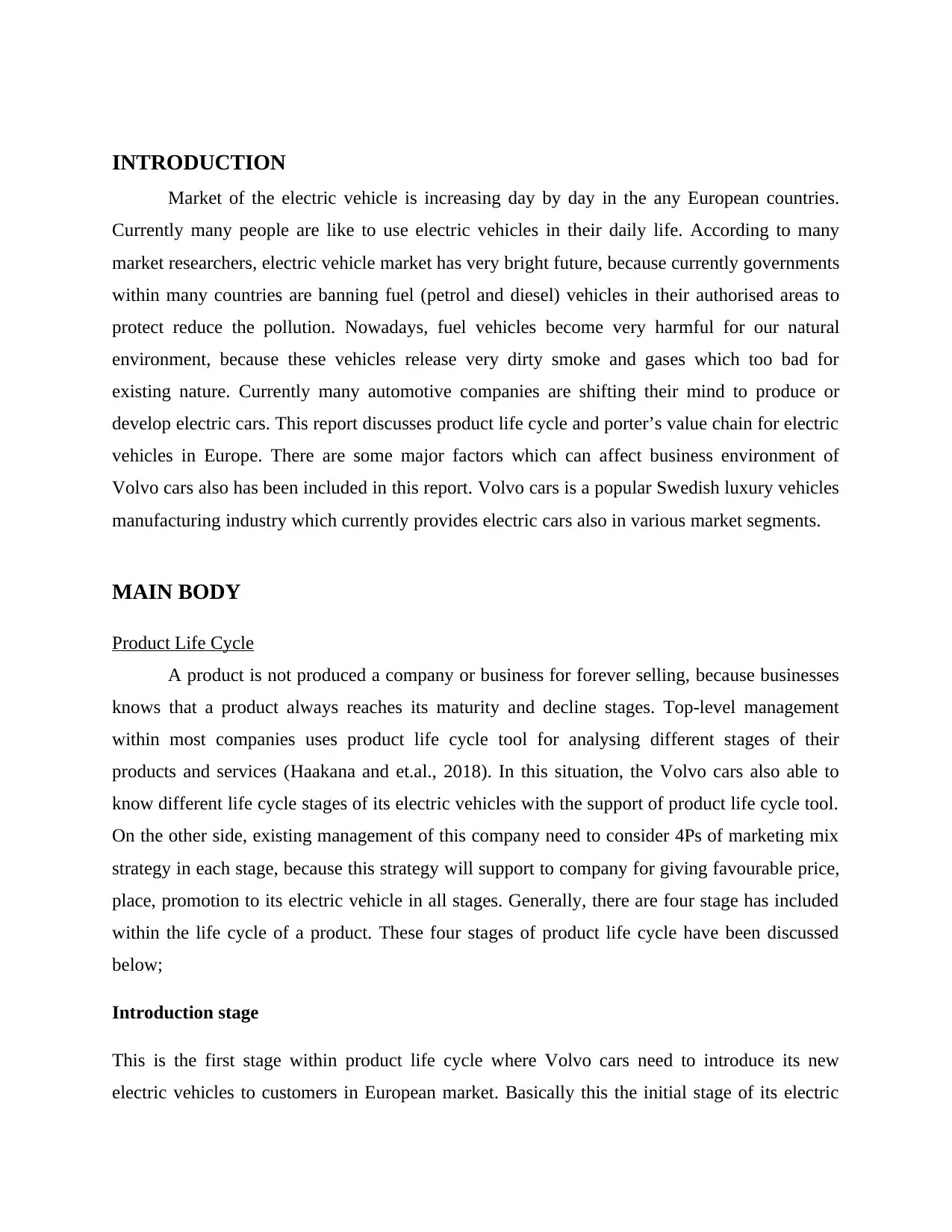
INTRODUCTION
Market of the electric vehicle is increasing day by day in the any European countries.
Currently many people are like to use electric vehicles in their daily life. According to many
market researchers, electric vehicle market has very bright future, because currently governments
within many countries are banning fuel (petrol and diesel) vehicles in their authorised areas to
protect reduce the pollution. Nowadays, fuel vehicles become very harmful for our natural
environment, because these vehicles release very dirty smoke and gases which too bad for
existing nature. Currently many automotive companies are shifting their mind to produce or
develop electric cars. This report discusses product life cycle and porter’s value chain for electric
vehicles in Europe. There are some major factors which can affect business environment of
Volvo cars also has been included in this report. Volvo cars is a popular Swedish luxury vehicles
manufacturing industry which currently provides electric cars also in various market segments.
MAIN BODY
Product Life Cycle
A product is not produced a company or business for forever selling, because businesses
knows that a product always reaches its maturity and decline stages. Top-level management
within most companies uses product life cycle tool for analysing different stages of their
products and services (Haakana and et.al., 2018). In this situation, the Volvo cars also able to
know different life cycle stages of its electric vehicles with the support of product life cycle tool.
On the other side, existing management of this company need to consider 4Ps of marketing mix
strategy in each stage, because this strategy will support to company for giving favourable price,
place, promotion to its electric vehicle in all stages. Generally, there are four stage has included
within the life cycle of a product. These four stages of product life cycle have been discussed
below;
Introduction stage
This is the first stage within product life cycle where Volvo cars need to introduce its new
electric vehicles to customers in European market. Basically this the initial stage of its electric
Market of the electric vehicle is increasing day by day in the any European countries.
Currently many people are like to use electric vehicles in their daily life. According to many
market researchers, electric vehicle market has very bright future, because currently governments
within many countries are banning fuel (petrol and diesel) vehicles in their authorised areas to
protect reduce the pollution. Nowadays, fuel vehicles become very harmful for our natural
environment, because these vehicles release very dirty smoke and gases which too bad for
existing nature. Currently many automotive companies are shifting their mind to produce or
develop electric cars. This report discusses product life cycle and porter’s value chain for electric
vehicles in Europe. There are some major factors which can affect business environment of
Volvo cars also has been included in this report. Volvo cars is a popular Swedish luxury vehicles
manufacturing industry which currently provides electric cars also in various market segments.
MAIN BODY
Product Life Cycle
A product is not produced a company or business for forever selling, because businesses
knows that a product always reaches its maturity and decline stages. Top-level management
within most companies uses product life cycle tool for analysing different stages of their
products and services (Haakana and et.al., 2018). In this situation, the Volvo cars also able to
know different life cycle stages of its electric vehicles with the support of product life cycle tool.
On the other side, existing management of this company need to consider 4Ps of marketing mix
strategy in each stage, because this strategy will support to company for giving favourable price,
place, promotion to its electric vehicle in all stages. Generally, there are four stage has included
within the life cycle of a product. These four stages of product life cycle have been discussed
below;
Introduction stage
This is the first stage within product life cycle where Volvo cars need to introduce its new
electric vehicles to customers in European market. Basically this the initial stage of its electric
⊘ This is a preview!⊘
Do you want full access?
Subscribe today to unlock all pages.

Trusted by 1+ million students worldwide
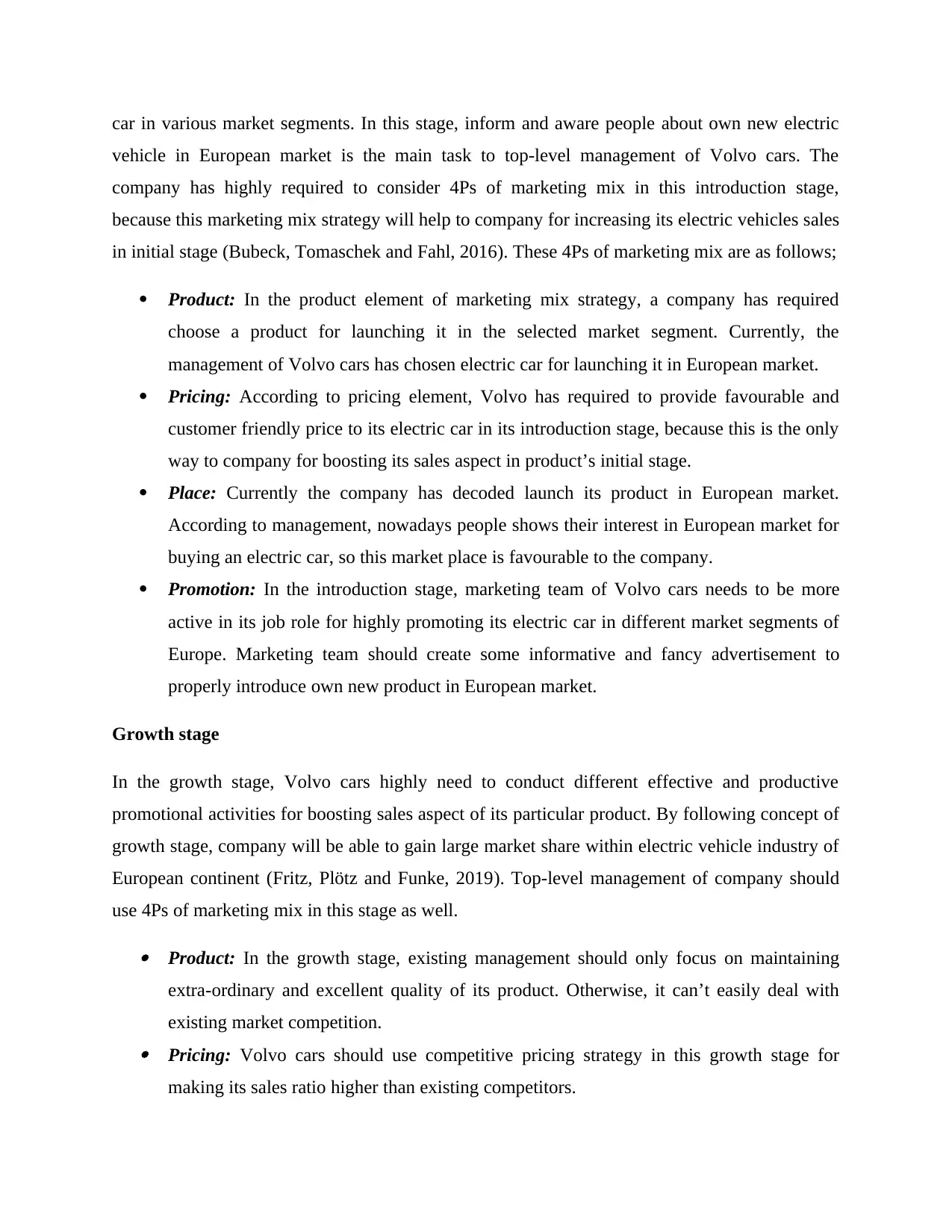
car in various market segments. In this stage, inform and aware people about own new electric
vehicle in European market is the main task to top-level management of Volvo cars. The
company has highly required to consider 4Ps of marketing mix in this introduction stage,
because this marketing mix strategy will help to company for increasing its electric vehicles sales
in initial stage (Bubeck, Tomaschek and Fahl, 2016). These 4Ps of marketing mix are as follows;
Product: In the product element of marketing mix strategy, a company has required
choose a product for launching it in the selected market segment. Currently, the
management of Volvo cars has chosen electric car for launching it in European market.
Pricing: According to pricing element, Volvo has required to provide favourable and
customer friendly price to its electric car in its introduction stage, because this is the only
way to company for boosting its sales aspect in product’s initial stage.
Place: Currently the company has decoded launch its product in European market.
According to management, nowadays people shows their interest in European market for
buying an electric car, so this market place is favourable to the company.
Promotion: In the introduction stage, marketing team of Volvo cars needs to be more
active in its job role for highly promoting its electric car in different market segments of
Europe. Marketing team should create some informative and fancy advertisement to
properly introduce own new product in European market.
Growth stage
In the growth stage, Volvo cars highly need to conduct different effective and productive
promotional activities for boosting sales aspect of its particular product. By following concept of
growth stage, company will be able to gain large market share within electric vehicle industry of
European continent (Fritz, Plötz and Funke, 2019). Top-level management of company should
use 4Ps of marketing mix in this stage as well.
Product: In the growth stage, existing management should only focus on maintaining
extra-ordinary and excellent quality of its product. Otherwise, it can’t easily deal with
existing market competition. Pricing: Volvo cars should use competitive pricing strategy in this growth stage for
making its sales ratio higher than existing competitors.
vehicle in European market is the main task to top-level management of Volvo cars. The
company has highly required to consider 4Ps of marketing mix in this introduction stage,
because this marketing mix strategy will help to company for increasing its electric vehicles sales
in initial stage (Bubeck, Tomaschek and Fahl, 2016). These 4Ps of marketing mix are as follows;
Product: In the product element of marketing mix strategy, a company has required
choose a product for launching it in the selected market segment. Currently, the
management of Volvo cars has chosen electric car for launching it in European market.
Pricing: According to pricing element, Volvo has required to provide favourable and
customer friendly price to its electric car in its introduction stage, because this is the only
way to company for boosting its sales aspect in product’s initial stage.
Place: Currently the company has decoded launch its product in European market.
According to management, nowadays people shows their interest in European market for
buying an electric car, so this market place is favourable to the company.
Promotion: In the introduction stage, marketing team of Volvo cars needs to be more
active in its job role for highly promoting its electric car in different market segments of
Europe. Marketing team should create some informative and fancy advertisement to
properly introduce own new product in European market.
Growth stage
In the growth stage, Volvo cars highly need to conduct different effective and productive
promotional activities for boosting sales aspect of its particular product. By following concept of
growth stage, company will be able to gain large market share within electric vehicle industry of
European continent (Fritz, Plötz and Funke, 2019). Top-level management of company should
use 4Ps of marketing mix in this stage as well.
Product: In the growth stage, existing management should only focus on maintaining
extra-ordinary and excellent quality of its product. Otherwise, it can’t easily deal with
existing market competition. Pricing: Volvo cars should use competitive pricing strategy in this growth stage for
making its sales ratio higher than existing competitors.
Paraphrase This Document
Need a fresh take? Get an instant paraphrase of this document with our AI Paraphraser
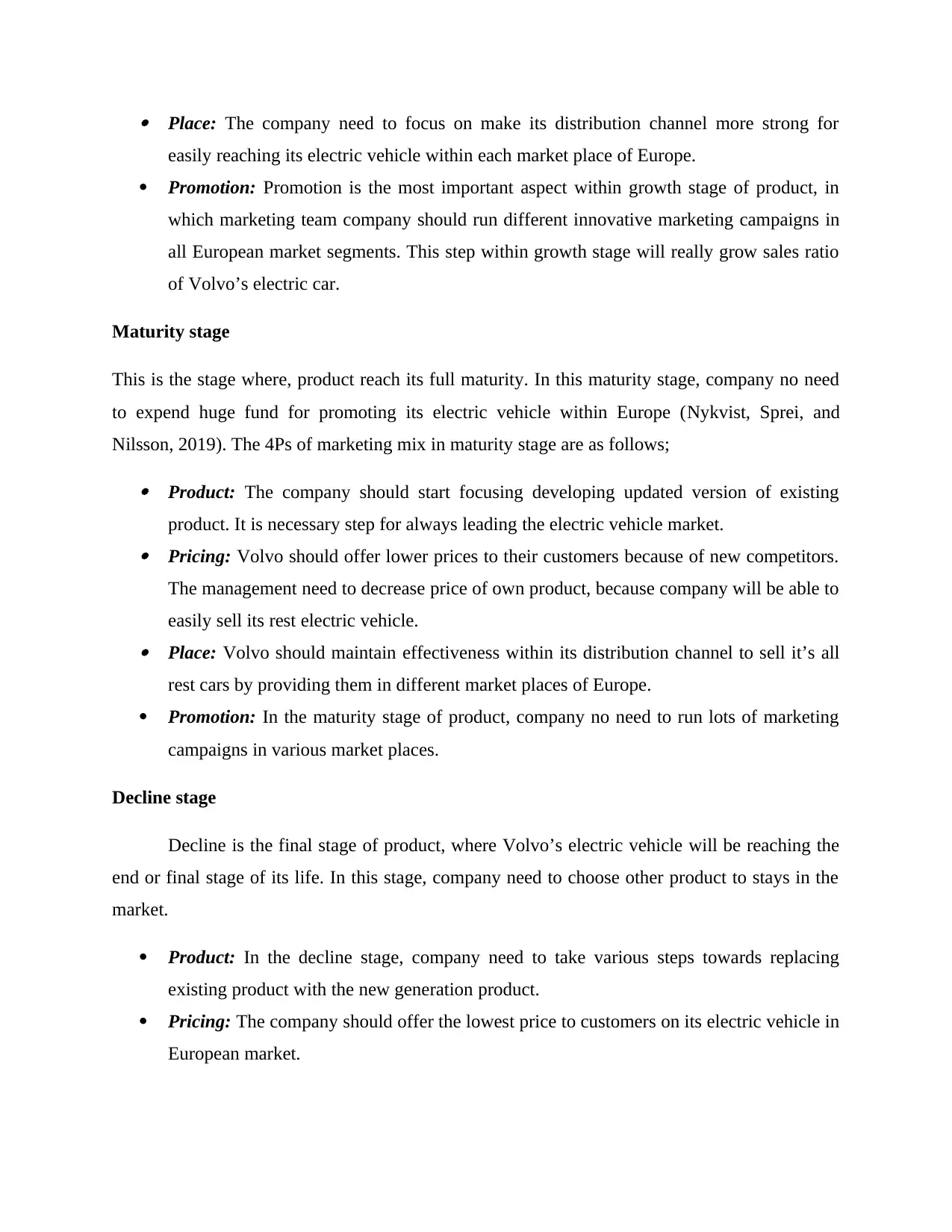
Place: The company need to focus on make its distribution channel more strong for
easily reaching its electric vehicle within each market place of Europe.
Promotion: Promotion is the most important aspect within growth stage of product, in
which marketing team company should run different innovative marketing campaigns in
all European market segments. This step within growth stage will really grow sales ratio
of Volvo’s electric car.
Maturity stage
This is the stage where, product reach its full maturity. In this maturity stage, company no need
to expend huge fund for promoting its electric vehicle within Europe (Nykvist, Sprei, and
Nilsson, 2019). The 4Ps of marketing mix in maturity stage are as follows;
Product: The company should start focusing developing updated version of existing
product. It is necessary step for always leading the electric vehicle market. Pricing: Volvo should offer lower prices to their customers because of new competitors.
The management need to decrease price of own product, because company will be able to
easily sell its rest electric vehicle. Place: Volvo should maintain effectiveness within its distribution channel to sell it’s all
rest cars by providing them in different market places of Europe.
Promotion: In the maturity stage of product, company no need to run lots of marketing
campaigns in various market places.
Decline stage
Decline is the final stage of product, where Volvo’s electric vehicle will be reaching the
end or final stage of its life. In this stage, company need to choose other product to stays in the
market.
Product: In the decline stage, company need to take various steps towards replacing
existing product with the new generation product.
Pricing: The company should offer the lowest price to customers on its electric vehicle in
European market.
easily reaching its electric vehicle within each market place of Europe.
Promotion: Promotion is the most important aspect within growth stage of product, in
which marketing team company should run different innovative marketing campaigns in
all European market segments. This step within growth stage will really grow sales ratio
of Volvo’s electric car.
Maturity stage
This is the stage where, product reach its full maturity. In this maturity stage, company no need
to expend huge fund for promoting its electric vehicle within Europe (Nykvist, Sprei, and
Nilsson, 2019). The 4Ps of marketing mix in maturity stage are as follows;
Product: The company should start focusing developing updated version of existing
product. It is necessary step for always leading the electric vehicle market. Pricing: Volvo should offer lower prices to their customers because of new competitors.
The management need to decrease price of own product, because company will be able to
easily sell its rest electric vehicle. Place: Volvo should maintain effectiveness within its distribution channel to sell it’s all
rest cars by providing them in different market places of Europe.
Promotion: In the maturity stage of product, company no need to run lots of marketing
campaigns in various market places.
Decline stage
Decline is the final stage of product, where Volvo’s electric vehicle will be reaching the
end or final stage of its life. In this stage, company need to choose other product to stays in the
market.
Product: In the decline stage, company need to take various steps towards replacing
existing product with the new generation product.
Pricing: The company should offer the lowest price to customers on its electric vehicle in
European market.
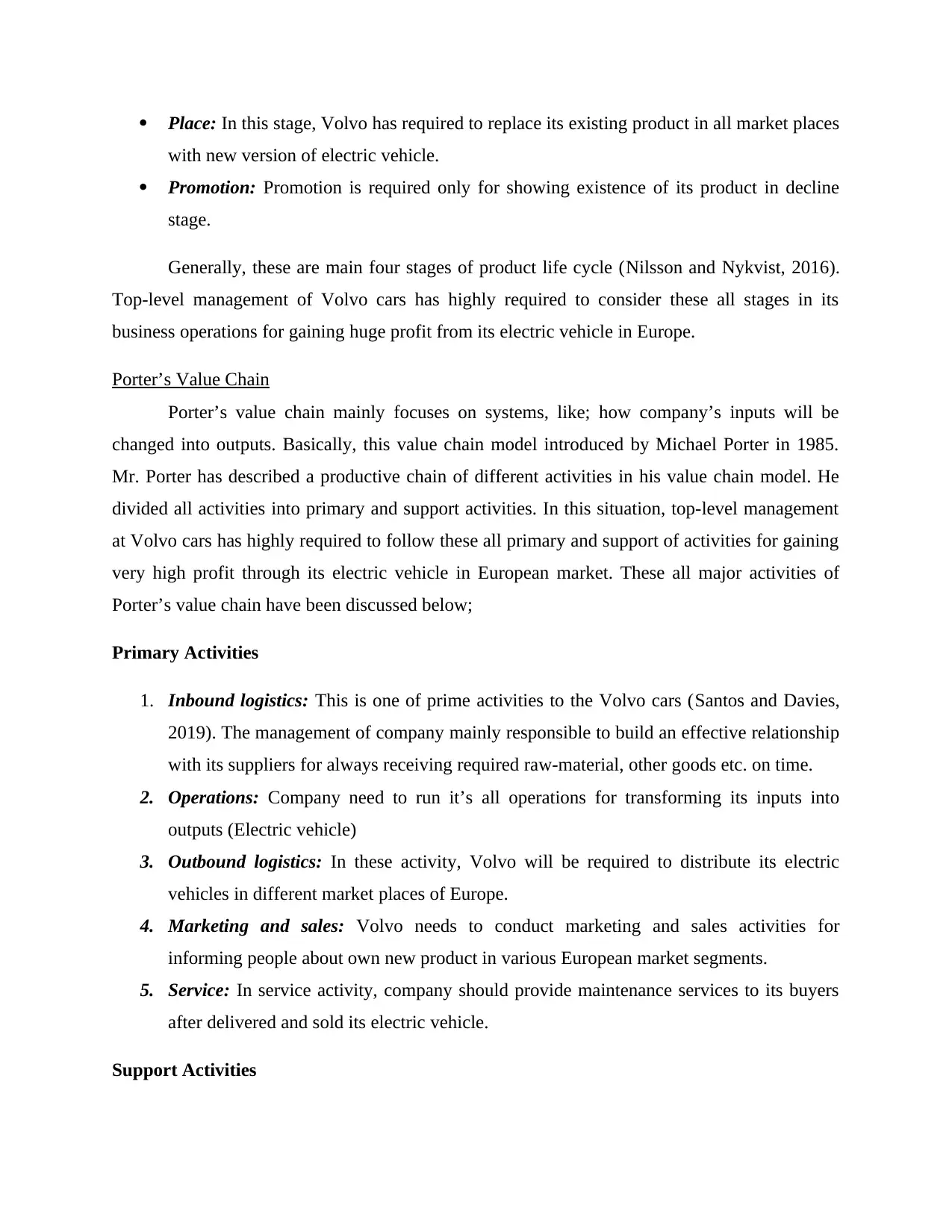
Place: In this stage, Volvo has required to replace its existing product in all market places
with new version of electric vehicle.
Promotion: Promotion is required only for showing existence of its product in decline
stage.
Generally, these are main four stages of product life cycle (Nilsson and Nykvist, 2016).
Top-level management of Volvo cars has highly required to consider these all stages in its
business operations for gaining huge profit from its electric vehicle in Europe.
Porter’s Value Chain
Porter’s value chain mainly focuses on systems, like; how company’s inputs will be
changed into outputs. Basically, this value chain model introduced by Michael Porter in 1985.
Mr. Porter has described a productive chain of different activities in his value chain model. He
divided all activities into primary and support activities. In this situation, top-level management
at Volvo cars has highly required to follow these all primary and support of activities for gaining
very high profit through its electric vehicle in European market. These all major activities of
Porter’s value chain have been discussed below;
Primary Activities
1. Inbound logistics: This is one of prime activities to the Volvo cars (Santos and Davies,
2019). The management of company mainly responsible to build an effective relationship
with its suppliers for always receiving required raw-material, other goods etc. on time.
2. Operations: Company need to run it’s all operations for transforming its inputs into
outputs (Electric vehicle)
3. Outbound logistics: In these activity, Volvo will be required to distribute its electric
vehicles in different market places of Europe.
4. Marketing and sales: Volvo needs to conduct marketing and sales activities for
informing people about own new product in various European market segments.
5. Service: In service activity, company should provide maintenance services to its buyers
after delivered and sold its electric vehicle.
Support Activities
with new version of electric vehicle.
Promotion: Promotion is required only for showing existence of its product in decline
stage.
Generally, these are main four stages of product life cycle (Nilsson and Nykvist, 2016).
Top-level management of Volvo cars has highly required to consider these all stages in its
business operations for gaining huge profit from its electric vehicle in Europe.
Porter’s Value Chain
Porter’s value chain mainly focuses on systems, like; how company’s inputs will be
changed into outputs. Basically, this value chain model introduced by Michael Porter in 1985.
Mr. Porter has described a productive chain of different activities in his value chain model. He
divided all activities into primary and support activities. In this situation, top-level management
at Volvo cars has highly required to follow these all primary and support of activities for gaining
very high profit through its electric vehicle in European market. These all major activities of
Porter’s value chain have been discussed below;
Primary Activities
1. Inbound logistics: This is one of prime activities to the Volvo cars (Santos and Davies,
2019). The management of company mainly responsible to build an effective relationship
with its suppliers for always receiving required raw-material, other goods etc. on time.
2. Operations: Company need to run it’s all operations for transforming its inputs into
outputs (Electric vehicle)
3. Outbound logistics: In these activity, Volvo will be required to distribute its electric
vehicles in different market places of Europe.
4. Marketing and sales: Volvo needs to conduct marketing and sales activities for
informing people about own new product in various European market segments.
5. Service: In service activity, company should provide maintenance services to its buyers
after delivered and sold its electric vehicle.
Support Activities
⊘ This is a preview!⊘
Do you want full access?
Subscribe today to unlock all pages.

Trusted by 1+ million students worldwide
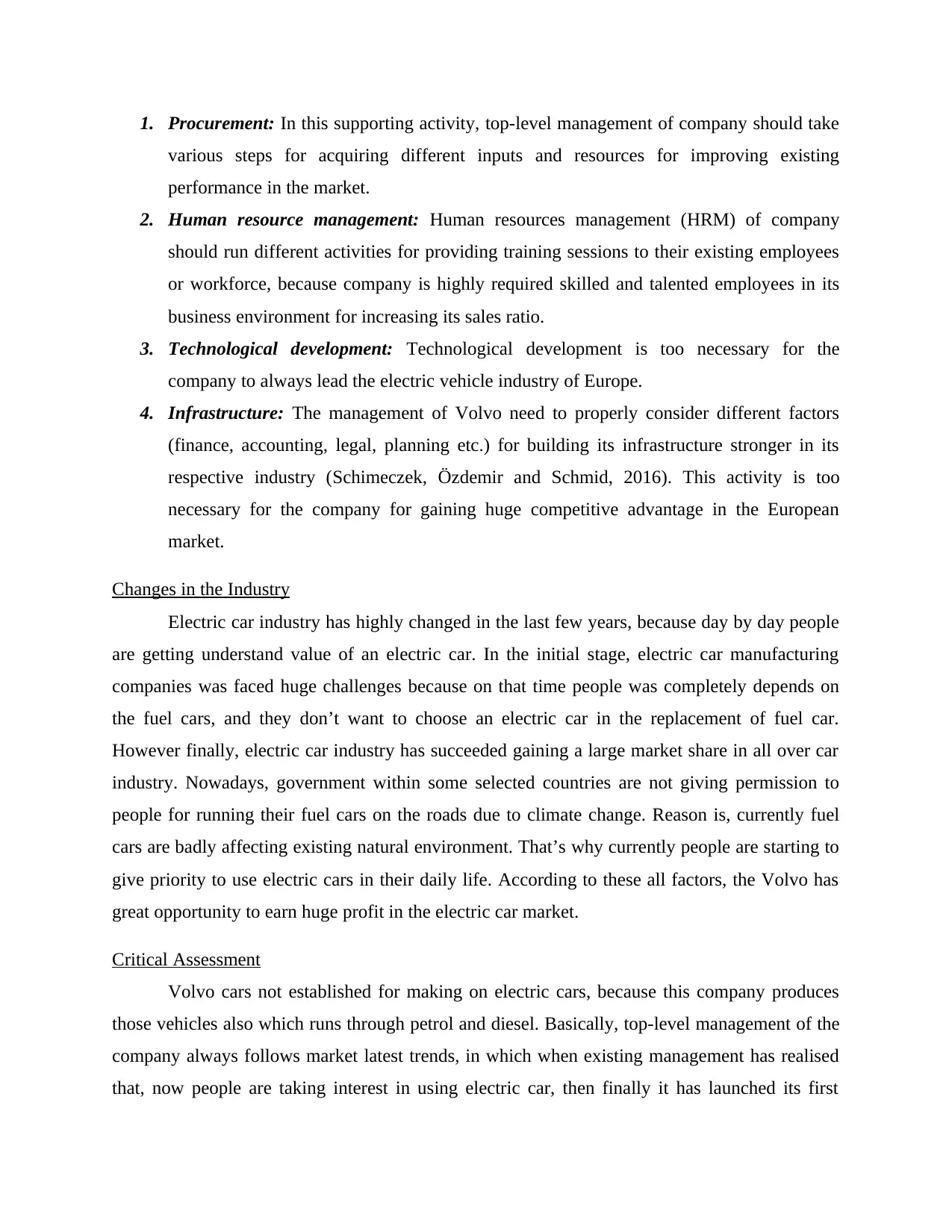
1. Procurement: In this supporting activity, top-level management of company should take
various steps for acquiring different inputs and resources for improving existing
performance in the market.
2. Human resource management: Human resources management (HRM) of company
should run different activities for providing training sessions to their existing employees
or workforce, because company is highly required skilled and talented employees in its
business environment for increasing its sales ratio.
3. Technological development: Technological development is too necessary for the
company to always lead the electric vehicle industry of Europe.
4. Infrastructure: The management of Volvo need to properly consider different factors
(finance, accounting, legal, planning etc.) for building its infrastructure stronger in its
respective industry (Schimeczek, Özdemir and Schmid, 2016). This activity is too
necessary for the company for gaining huge competitive advantage in the European
market.
Changes in the Industry
Electric car industry has highly changed in the last few years, because day by day people
are getting understand value of an electric car. In the initial stage, electric car manufacturing
companies was faced huge challenges because on that time people was completely depends on
the fuel cars, and they don’t want to choose an electric car in the replacement of fuel car.
However finally, electric car industry has succeeded gaining a large market share in all over car
industry. Nowadays, government within some selected countries are not giving permission to
people for running their fuel cars on the roads due to climate change. Reason is, currently fuel
cars are badly affecting existing natural environment. That’s why currently people are starting to
give priority to use electric cars in their daily life. According to these all factors, the Volvo has
great opportunity to earn huge profit in the electric car market.
Critical Assessment
Volvo cars not established for making on electric cars, because this company produces
those vehicles also which runs through petrol and diesel. Basically, top-level management of the
company always follows market latest trends, in which when existing management has realised
that, now people are taking interest in using electric car, then finally it has launched its first
various steps for acquiring different inputs and resources for improving existing
performance in the market.
2. Human resource management: Human resources management (HRM) of company
should run different activities for providing training sessions to their existing employees
or workforce, because company is highly required skilled and talented employees in its
business environment for increasing its sales ratio.
3. Technological development: Technological development is too necessary for the
company to always lead the electric vehicle industry of Europe.
4. Infrastructure: The management of Volvo need to properly consider different factors
(finance, accounting, legal, planning etc.) for building its infrastructure stronger in its
respective industry (Schimeczek, Özdemir and Schmid, 2016). This activity is too
necessary for the company for gaining huge competitive advantage in the European
market.
Changes in the Industry
Electric car industry has highly changed in the last few years, because day by day people
are getting understand value of an electric car. In the initial stage, electric car manufacturing
companies was faced huge challenges because on that time people was completely depends on
the fuel cars, and they don’t want to choose an electric car in the replacement of fuel car.
However finally, electric car industry has succeeded gaining a large market share in all over car
industry. Nowadays, government within some selected countries are not giving permission to
people for running their fuel cars on the roads due to climate change. Reason is, currently fuel
cars are badly affecting existing natural environment. That’s why currently people are starting to
give priority to use electric cars in their daily life. According to these all factors, the Volvo has
great opportunity to earn huge profit in the electric car market.
Critical Assessment
Volvo cars not established for making on electric cars, because this company produces
those vehicles also which runs through petrol and diesel. Basically, top-level management of the
company always follows market latest trends, in which when existing management has realised
that, now people are taking interest in using electric car, then finally it has launched its first
Paraphrase This Document
Need a fresh take? Get an instant paraphrase of this document with our AI Paraphraser
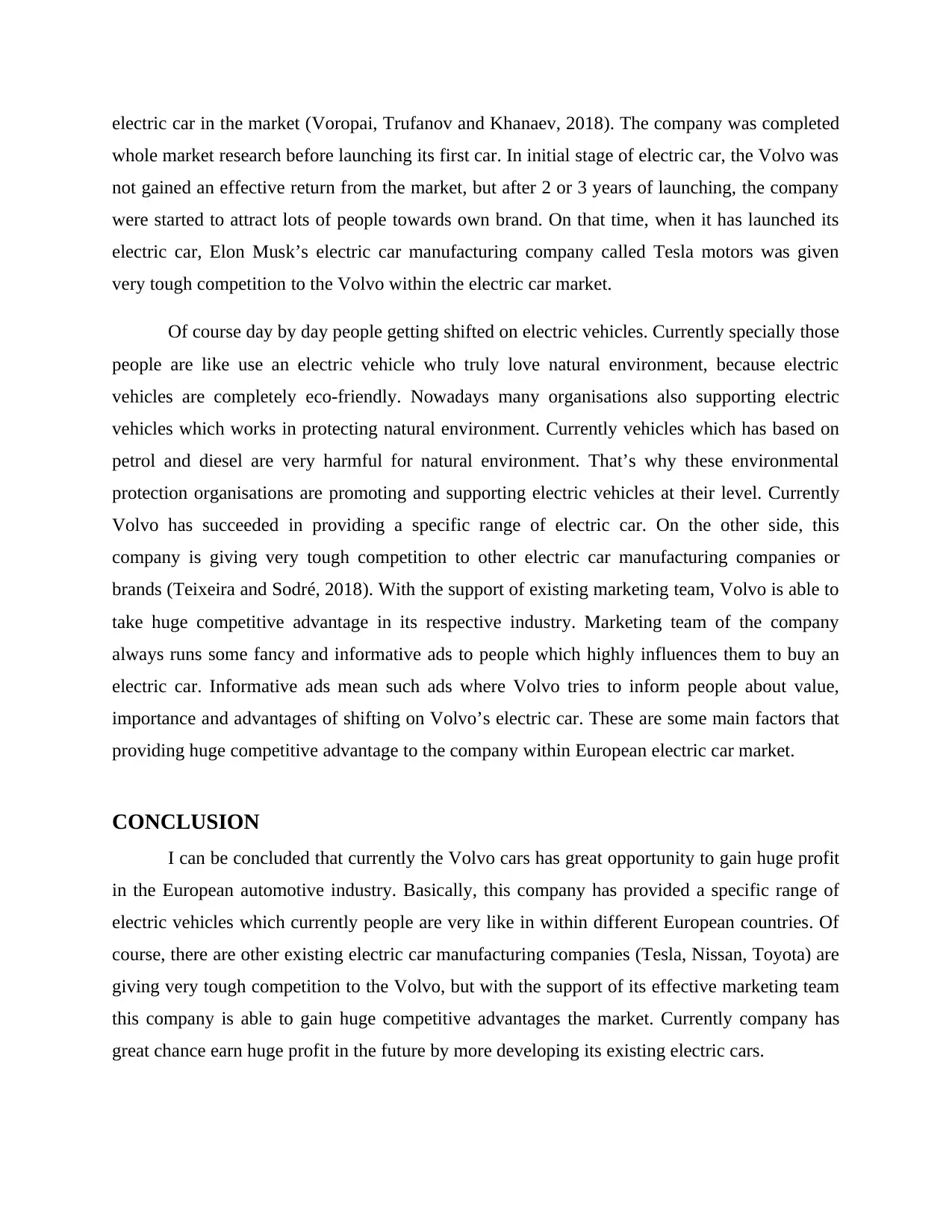
electric car in the market (Voropai, Trufanov and Khanaev, 2018). The company was completed
whole market research before launching its first car. In initial stage of electric car, the Volvo was
not gained an effective return from the market, but after 2 or 3 years of launching, the company
were started to attract lots of people towards own brand. On that time, when it has launched its
electric car, Elon Musk’s electric car manufacturing company called Tesla motors was given
very tough competition to the Volvo within the electric car market.
Of course day by day people getting shifted on electric vehicles. Currently specially those
people are like use an electric vehicle who truly love natural environment, because electric
vehicles are completely eco-friendly. Nowadays many organisations also supporting electric
vehicles which works in protecting natural environment. Currently vehicles which has based on
petrol and diesel are very harmful for natural environment. That’s why these environmental
protection organisations are promoting and supporting electric vehicles at their level. Currently
Volvo has succeeded in providing a specific range of electric car. On the other side, this
company is giving very tough competition to other electric car manufacturing companies or
brands (Teixeira and Sodré, 2018). With the support of existing marketing team, Volvo is able to
take huge competitive advantage in its respective industry. Marketing team of the company
always runs some fancy and informative ads to people which highly influences them to buy an
electric car. Informative ads mean such ads where Volvo tries to inform people about value,
importance and advantages of shifting on Volvo’s electric car. These are some main factors that
providing huge competitive advantage to the company within European electric car market.
CONCLUSION
I can be concluded that currently the Volvo cars has great opportunity to gain huge profit
in the European automotive industry. Basically, this company has provided a specific range of
electric vehicles which currently people are very like in within different European countries. Of
course, there are other existing electric car manufacturing companies (Tesla, Nissan, Toyota) are
giving very tough competition to the Volvo, but with the support of its effective marketing team
this company is able to gain huge competitive advantages the market. Currently company has
great chance earn huge profit in the future by more developing its existing electric cars.
whole market research before launching its first car. In initial stage of electric car, the Volvo was
not gained an effective return from the market, but after 2 or 3 years of launching, the company
were started to attract lots of people towards own brand. On that time, when it has launched its
electric car, Elon Musk’s electric car manufacturing company called Tesla motors was given
very tough competition to the Volvo within the electric car market.
Of course day by day people getting shifted on electric vehicles. Currently specially those
people are like use an electric vehicle who truly love natural environment, because electric
vehicles are completely eco-friendly. Nowadays many organisations also supporting electric
vehicles which works in protecting natural environment. Currently vehicles which has based on
petrol and diesel are very harmful for natural environment. That’s why these environmental
protection organisations are promoting and supporting electric vehicles at their level. Currently
Volvo has succeeded in providing a specific range of electric car. On the other side, this
company is giving very tough competition to other electric car manufacturing companies or
brands (Teixeira and Sodré, 2018). With the support of existing marketing team, Volvo is able to
take huge competitive advantage in its respective industry. Marketing team of the company
always runs some fancy and informative ads to people which highly influences them to buy an
electric car. Informative ads mean such ads where Volvo tries to inform people about value,
importance and advantages of shifting on Volvo’s electric car. These are some main factors that
providing huge competitive advantage to the company within European electric car market.
CONCLUSION
I can be concluded that currently the Volvo cars has great opportunity to gain huge profit
in the European automotive industry. Basically, this company has provided a specific range of
electric vehicles which currently people are very like in within different European countries. Of
course, there are other existing electric car manufacturing companies (Tesla, Nissan, Toyota) are
giving very tough competition to the Volvo, but with the support of its effective marketing team
this company is able to gain huge competitive advantages the market. Currently company has
great chance earn huge profit in the future by more developing its existing electric cars.
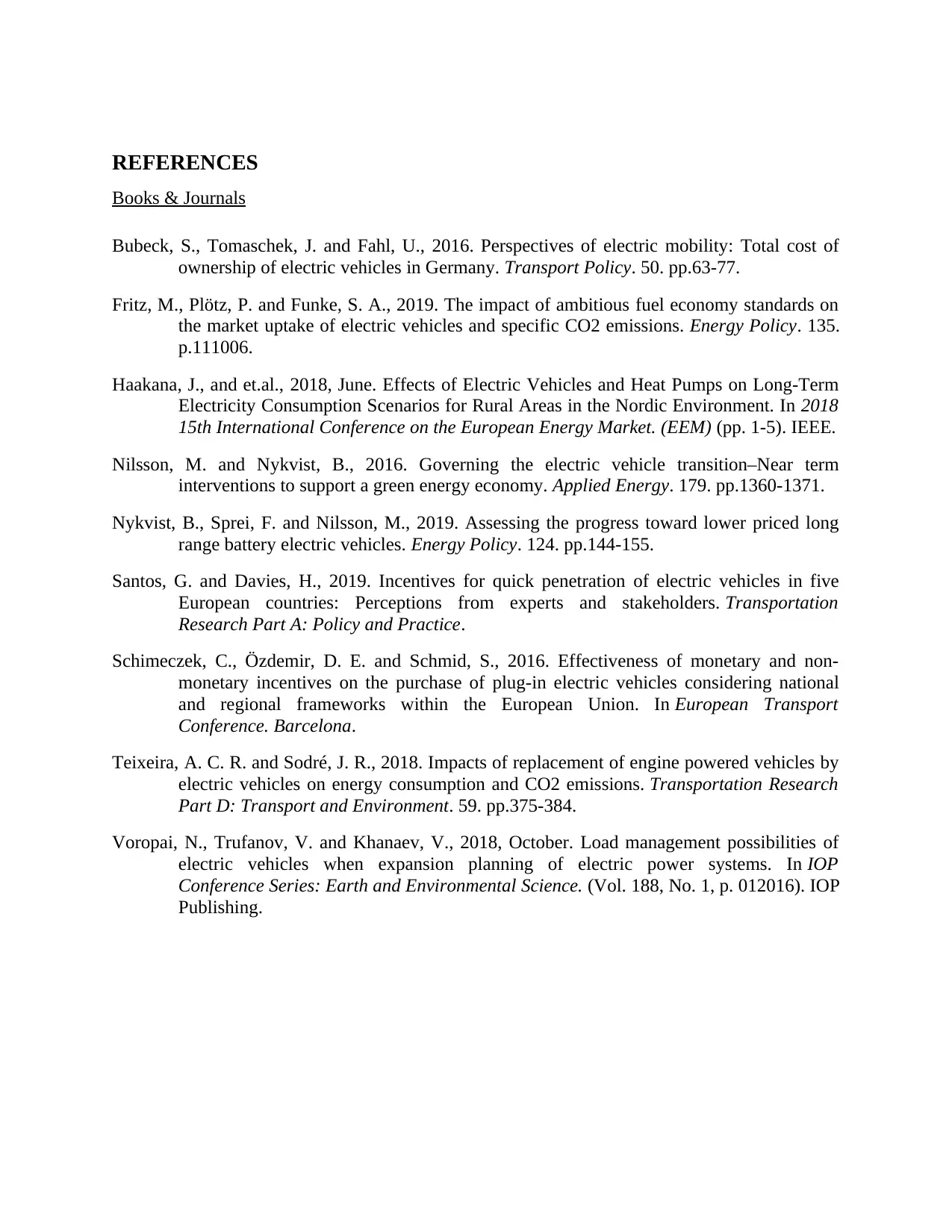
REFERENCES
Books & Journals
Bubeck, S., Tomaschek, J. and Fahl, U., 2016. Perspectives of electric mobility: Total cost of
ownership of electric vehicles in Germany. Transport Policy. 50. pp.63-77.
Fritz, M., Plötz, P. and Funke, S. A., 2019. The impact of ambitious fuel economy standards on
the market uptake of electric vehicles and specific CO2 emissions. Energy Policy. 135.
p.111006.
Haakana, J., and et.al., 2018, June. Effects of Electric Vehicles and Heat Pumps on Long-Term
Electricity Consumption Scenarios for Rural Areas in the Nordic Environment. In 2018
15th International Conference on the European Energy Market. (EEM) (pp. 1-5). IEEE.
Nilsson, M. and Nykvist, B., 2016. Governing the electric vehicle transition–Near term
interventions to support a green energy economy. Applied Energy. 179. pp.1360-1371.
Nykvist, B., Sprei, F. and Nilsson, M., 2019. Assessing the progress toward lower priced long
range battery electric vehicles. Energy Policy. 124. pp.144-155.
Santos, G. and Davies, H., 2019. Incentives for quick penetration of electric vehicles in five
European countries: Perceptions from experts and stakeholders. Transportation
Research Part A: Policy and Practice.
Schimeczek, C., Özdemir, D. E. and Schmid, S., 2016. Effectiveness of monetary and non-
monetary incentives on the purchase of plug-in electric vehicles considering national
and regional frameworks within the European Union. In European Transport
Conference. Barcelona.
Teixeira, A. C. R. and Sodré, J. R., 2018. Impacts of replacement of engine powered vehicles by
electric vehicles on energy consumption and CO2 emissions. Transportation Research
Part D: Transport and Environment. 59. pp.375-384.
Voropai, N., Trufanov, V. and Khanaev, V., 2018, October. Load management possibilities of
electric vehicles when expansion planning of electric power systems. In IOP
Conference Series: Earth and Environmental Science. (Vol. 188, No. 1, p. 012016). IOP
Publishing.
Books & Journals
Bubeck, S., Tomaschek, J. and Fahl, U., 2016. Perspectives of electric mobility: Total cost of
ownership of electric vehicles in Germany. Transport Policy. 50. pp.63-77.
Fritz, M., Plötz, P. and Funke, S. A., 2019. The impact of ambitious fuel economy standards on
the market uptake of electric vehicles and specific CO2 emissions. Energy Policy. 135.
p.111006.
Haakana, J., and et.al., 2018, June. Effects of Electric Vehicles and Heat Pumps on Long-Term
Electricity Consumption Scenarios for Rural Areas in the Nordic Environment. In 2018
15th International Conference on the European Energy Market. (EEM) (pp. 1-5). IEEE.
Nilsson, M. and Nykvist, B., 2016. Governing the electric vehicle transition–Near term
interventions to support a green energy economy. Applied Energy. 179. pp.1360-1371.
Nykvist, B., Sprei, F. and Nilsson, M., 2019. Assessing the progress toward lower priced long
range battery electric vehicles. Energy Policy. 124. pp.144-155.
Santos, G. and Davies, H., 2019. Incentives for quick penetration of electric vehicles in five
European countries: Perceptions from experts and stakeholders. Transportation
Research Part A: Policy and Practice.
Schimeczek, C., Özdemir, D. E. and Schmid, S., 2016. Effectiveness of monetary and non-
monetary incentives on the purchase of plug-in electric vehicles considering national
and regional frameworks within the European Union. In European Transport
Conference. Barcelona.
Teixeira, A. C. R. and Sodré, J. R., 2018. Impacts of replacement of engine powered vehicles by
electric vehicles on energy consumption and CO2 emissions. Transportation Research
Part D: Transport and Environment. 59. pp.375-384.
Voropai, N., Trufanov, V. and Khanaev, V., 2018, October. Load management possibilities of
electric vehicles when expansion planning of electric power systems. In IOP
Conference Series: Earth and Environmental Science. (Vol. 188, No. 1, p. 012016). IOP
Publishing.
⊘ This is a preview!⊘
Do you want full access?
Subscribe today to unlock all pages.

Trusted by 1+ million students worldwide
1 out of 9
Related Documents
Your All-in-One AI-Powered Toolkit for Academic Success.
+13062052269
info@desklib.com
Available 24*7 on WhatsApp / Email
![[object Object]](/_next/static/media/star-bottom.7253800d.svg)
Unlock your academic potential
Copyright © 2020–2026 A2Z Services. All Rights Reserved. Developed and managed by ZUCOL.





